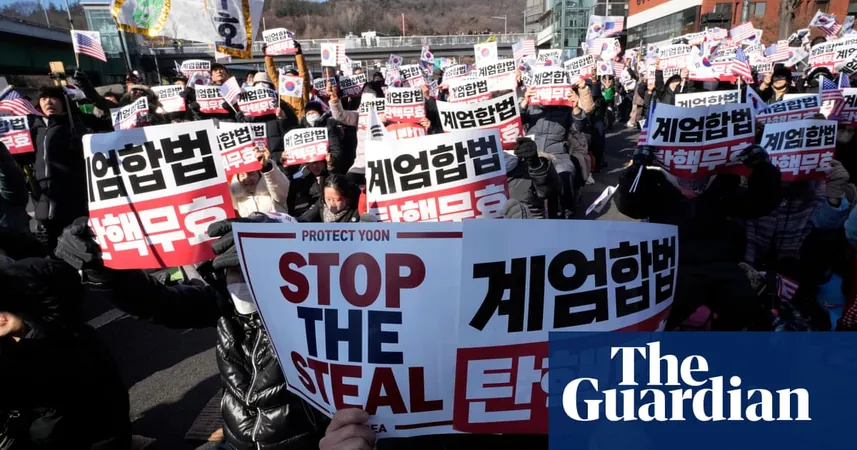
South Korea’s Impeached President Yoon Suk Yeol Declares a Defiant Fight Amid Arrest Warrant
2025-01-02
Author: Ting
Former South Korean President Yoon Suk Yeol, who has been impeached, has boldly pledged to “fight until the end” in the face of a looming arrest warrant tied to a controversial martial law declaration earlier this month. In a passionate letter addressed to his supporters, Yoon expressed his deep appreciation for their backing during a challenging time, insisting that he would not back down from his fight for the nation.
"I am watching your valiant efforts on YouTube live,” Yoon wrote to the multitude of supporters rallying outside his official residence, fervently protesting the ongoing investigation into his actions. He reiterated his commitment, saying, "I will fight until the end to protect this country together with you." This declaration comes in the wake of significant political upheaval, which has taken South Korea by storm.
Yoon was impeached by the majority-opposition Democratic Party on December 14, following his controversial decision to declare martial law on December 3. The fallout has been considerable, with the party labeling Yoon’s latest letter as evidence of delusion, accusing him of inciting his supporters towards violent confrontation. “As if attempting an insurrection was not enough, he now urges his followers towards extreme actions,” remarked party spokesperson Jo Seoung-lae.
In a groundbreaking move, a South Korean court approved an arrest warrant for Yoon, potentially making him the first sitting president to face detention in connection with insurrection-related allegations. Significantly, South Korean law does not grant presidential immunity for charges of insurrection, a reality that could have significant ramifications for Yoon’s political future.
The Corruption Investigation Office for High-Ranking Officials (CIO) is spearheading the investigation alongside police and prosecutors, and they have until January 6 to conduct the arrest. However, the complexity of the situation is evident; the presidential security service has consistently barred investigators from accessing Yoon's official spaces even with a valid search warrant.
Yoon Kab-keun, Yoon’s legal representative, has labeled the arrest warrant as both illegal and invalid, asserting that the CIO lacks the jurisdiction to request such a warrant under current South Korean law. He has issued a stark warning that any attempt to detain Yoon could provoke a public outcry or backlash from security personnel.
Compounding the turmoil, Yoon's impeachment trial is set to have its second hearing at the Constitutional Court this Friday. Until the trial's conclusion, Yoon has been stripped of his presidential responsibilities, with Finance Minister Choi Sang-mok assuming the role of acting president during this transitional period.
Should the court uphold the impeachment, South Korea would face another presidential election within 60 days, marking a significant shift in the country’s political landscape.
In a related development, a former defense minister, accused of advising Yoon on the martial law declaration, is facing insurrection charges and is scheduled to stand trial on January 16. Additionally, several top military officers who were allegedly involved in supporting the controversial martial law have also been indicted.
As South Korea stands on the brink of a political crisis, the tension surrounding Yoon Suk Yeol’s fate continues to escalate, proposing questions about the future governance of the nation. What will happen if Yoon is arrested? Could this lead to widespread unrest? One thing is certain: the stakes have never been higher.

 Brasil (PT)
Brasil (PT)
 Canada (EN)
Canada (EN)
 Chile (ES)
Chile (ES)
 Česko (CS)
Česko (CS)
 대한민국 (KO)
대한민국 (KO)
 España (ES)
España (ES)
 France (FR)
France (FR)
 Hong Kong (EN)
Hong Kong (EN)
 Italia (IT)
Italia (IT)
 日本 (JA)
日本 (JA)
 Magyarország (HU)
Magyarország (HU)
 Norge (NO)
Norge (NO)
 Polska (PL)
Polska (PL)
 Schweiz (DE)
Schweiz (DE)
 Singapore (EN)
Singapore (EN)
 Sverige (SV)
Sverige (SV)
 Suomi (FI)
Suomi (FI)
 Türkiye (TR)
Türkiye (TR)
 الإمارات العربية المتحدة (AR)
الإمارات العربية المتحدة (AR)